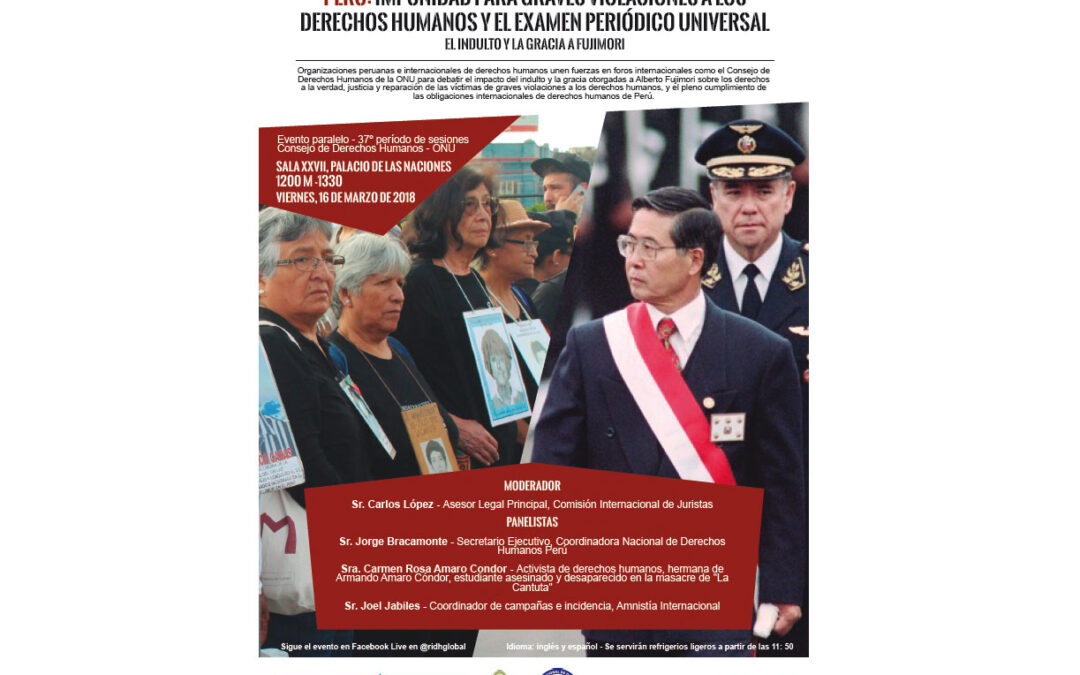
Mar 13, 2018 | Uncategorized
Este evento paralelo – 37º período de sesiones, Consejo de Derechos Humanos, ONU – tendrá lugar el Viernes, 16 de marzo de 2018, 1200 m-1330, Sala XXVII, Palacio de las Naciones, Ginebra, con el apoyo de la CIJ.
Organizaciones peruanas e internacionales de derechos humanos unen fuerzas en foros internacionales como el Consejo de Derechos Humanos de la ONU para debatir el impacto del indulto y la gracia otorgadas a Alberto Fujimori sobre los derechos a la verdad, justicia y reparación de las víctimas de graves violaciones a los derechos humanos, y el pleno cumplimiento de las obligaciones internacionales de derechos humanos de Perú.
Moderador
- Sr. Carlos López – Asesor Legal Principal, Comisión Internacional de Juristas
Panelistas
- Sr. Jorge Bracamonte – Secretario Ejecutivo, Coordinadora Nacional de Derechos
Humanos Perú
- Sra. Carmen Rosa Amaro Condor – Activista de derechos humanos, hermana de
Armando Amaro Cóndor, estudiante asesinado y desaparecido en la masacre de “La
Cantuta”
- Sr. Joel Jabiles – Coordinador de campañas e incidencia, Amnistía Internacional
Sigue el evento en Facebook Live en @ridhglobal
Idioma: inglés y español – Se servirán refrigerios ligeros a partir de las 11:50
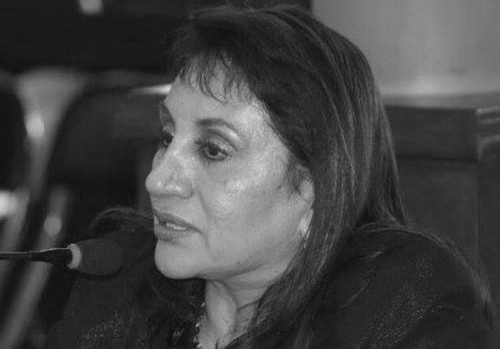
Feb 16, 2018 | Comunicados de prensa, Noticias
La CIJ considera que el ataque contra la Fiscal Sonia Montes constituye un grave atentado contra la justicia en el país.
La CIJ exige al Presidente de la República, como Jefe de la fuerza pública, esclarecer estos hechos a la mayor brevedad posible y tomar las medidas necesarias para que los presuntos autores de estos hechos sean llevados ante la justicia.
La CIJ destaca que el papel que viene jugando la Fiscal Sonia Montes en la búsqueda de justicia en casos de graves violaciones a los derechos humanos cometidos por miembros de las Fuerzas Armadas durante el conflicto armado interno, ha cobrado mayor relevancia en estos días, cuando el juicio por el delito de Genocidio se ha reiniciado semanas atrás.
“Este atentado constituye un ataque contra la justicia en Guatemala así como contra de todo el movimiento de derechos humanos de ese país. Este tipo de ataques pretenden afectar seriamente la Democracia y el Estado de Derecho y obstruir la justicia,” declaró Ramón Cadena, Director de la CIJ para Centroamérica.
Ante estos hechos condenables, la CIJ expresa su total solidaridad hacia la Fiscal de Derechos Humanos Sonia Montes, su familia y su motorista Néstor Valdes Antonio; asímismo, expresa su apoyo a la Fiscal General Thelma Aldana y al Comisionado de la Comisión Internacional contra la Impunidad (CICIG), Iván Velásquez y a todas y todos los fiscales y operadores de justicia, que realizan un trabajo diario y comprometido con la lucha contra la impunidad y la corrupción.
Ramón Cadena, Director de la CIJ para Centroamérica expresó:
“Exigimos al Presidente de la República Jimmy Morales una investigación pronta y eficiente, que permita individualizar la responsabilidad penal de los autores materiales e intelectuales de estos hechos. Hacemos un llamado a la ciudadanía guatemalteca, para no dejarse intimidar ante estos hechos de violencia.”
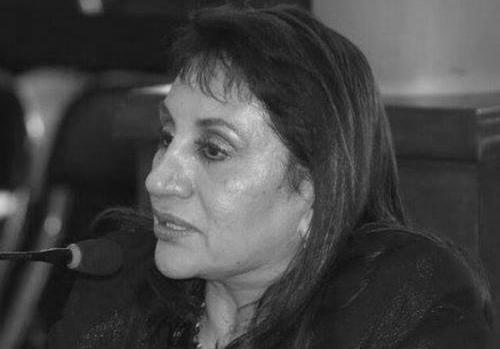
Feb 16, 2018 | News
The ICJ strongly condemns the attack against the Deputy Prosecutor for Human Rights, Sonia Elizabeth Montes Valenzuela, carried out on 15 February by unknown gunmen in the central Zone 1 of Guatemala City.
Sonia Montes was on her way to work at the Public Prosecutors Office when two gunmen on motorbikes drove past and fired six bullets into the car.
Fortunately both Sonia Montes and her driver, Néstor Valdes Antonio, were unharmed.
“This is a vile attack against the justice system in Guatemala and the whole human rights movement in the country. These types of attacks seek to destabilize democracy and the rule of law,” Ramón Cadena, the ICJ Director stated.
“We call on President Jimmy Morales to carry out a full and impartial investigation in order to identify the material and moral authors of these acts,” he added.
The ICJ also expresses its solidarity with the families of the victims of the attack and with the Attorney General, Thelma Aldana, and the Commissioner of the International Commission against Impunity (CICIG), Iván Velásquez.
The Public Prosecutors’ Office and the CICIG are working tirelessly to investigate crimes and to end impunity and corruption in Guatemala.
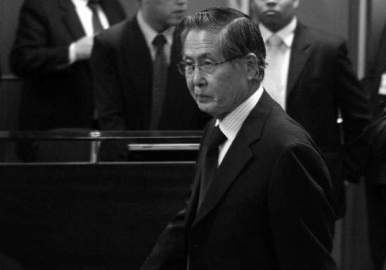
Feb 9, 2018 | Artículos, Noticias
Hoy la CIJ y varias otras organizaciones presentaron un amicus curiae a la Corte Interamericana de Derechos Humanos (Corte IDH) en el contexto del proceso de supervisión de cumplimiento de las sentencias dictadas en los casos Barrios Altos y La Cantuta.
Esta supervisión se solicitó a causa de la Resolución Suprema N° 281-2017-JUS del 24 de diciembre de 2017, que concede al ex presidente Alberto Fujimori “el indulto y derecho de gracia por razones humanitarias”.
El indulto otorgado tiene como efecto que el ex mandatario se encuentre actualmente en libertad, a pesar de haber sido condenado a 25 años de prisión por la comisión de graves violaciones de derechos humanos, creando asi un incentivo a la impunidad en el país.
El amicus curiae sostiene que el indulto, tal como ha sido otorgado, es contrario a obligaciones internacionales asumidas por el Perú y, en concreto, desacata lo establecido por la Corte IDH en las sentencias de los casos Barrios Altos y La Cantuta.
El escrito plantea que la potestad presidencial para conferir indultos en el Perú debe ser ejercida en el marco de un Estado Constitucional y Democrático de Derecho.
Si bien el indulto es una atribución presidencial discrecional, ésta no debe ser ejercida arbitrariamente. Se trata de una institución que tiene límites y que debe ejercerse de manera excepcional, siguiendo las normas internas sobre la materia.
El indulto no procede en casos de graves violaciones a los derechos humanos o crímenes de lesa humanidad, como lo son Barrios Altos y La Cantuta.
Los términos en que fue concedido incumple la garantía de necesidad frente a otras medidas que pudiesen preservar la dignidad y la salud del señor Fujimori.
Amiciconcluye que el indulto y gracia otorgados a Alberto Fujimori son contrarios a las obligaciones internacionales en materia de derechos humanos asumidas por el Perú. Se pide a la Corte Interamericana ordenar al Estado dejar sin efectos la Resolución Suprema N° 281-2017-JUS.
Las otras organizaciones que presentaron el amicus curiae con la CIJ son Abogados sin Fronteras, la Clínica de Derechos Humanos de la Universidad de Ottawa, la Clínica de Derechos Humanos de la Universidad de Quebec en Montreal, la Fundación para el Debido Proceso, y el Instituto de Democracia y Derechos Humanos de la Pontificia Universidad Católica del Perú (IDEHPUCP).
Peru-Amicus Curiae CorteIDH Casos Barrios Altos y La Cantuta-Advocacy-Legal submission-2018-SPA (Amicus Curiae en PDF)
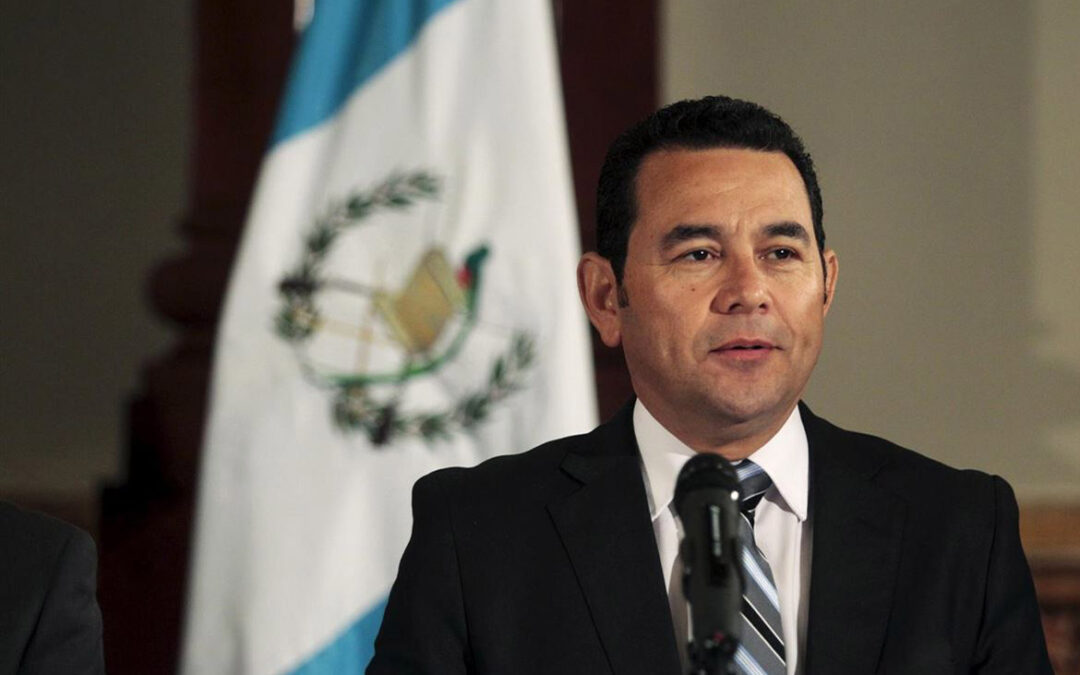
Jan 18, 2018 | Artículos, Noticias
La CIJ está hondamente preocupada por los últimos actos del poder ejecutivo y del Congreso de la República, que atentan contra la vigencia del estado de derecho y de los derechos humanos en Guatemala.
“Las autoridades del Estado de Guatemala al más alto nivel están implementando una política exterior fundamentada en una errónea interpretación de la soberanía nacional y en el absoluto desprecio por el derecho internacional de los derechos humanos, todo ello para defender los intereses personales de funcionarios de los tres poderes del Estado y así hacer prevalecer el sistema de impunidad que ha existido en el país, en las últimas décadas. Todo ello es parte del Pacto de Corrupción e Impunidad que existe en el país y que proviene de las autoridades al más alto nivel.”, declaró Ramón Cadena, Director de la CIJ para Centro América.
Por ende, y con fundamento en la Convención Interamericana contra la Corrupción y la Convención Americana sobre Derechos Humanos, la CIJ hace un llamado a la Comisión Interamericana de Derechos Humanos para que envíe una misión al país, con el mandato de investigar la existencia de este Pacto de Corrupción e Impunidad y evitar así, que avance y cause un grave daño irreparable a la democracia y al pueblo de Guatemala.
Asímismo, con fundamento en la Convención de Naciones Unidas contra la Corrupción, urge a la Representante Residente del Sistema de Naciones Unidas, a tomar las medidas adecuadas para evitar que continúe avanzando dicho pacto.
El Presidente Jimmy Morales (foto) declaró sin ningún fundamento, persona non grata al Comisionado de la Comisión Internacional contra la Impunidad en Guatemala (CICIG), Sr. Iván Velásquez; posteriormente, diputados y diputadas del Congreso de la República intentaron reformar el Código Penal; recientemente, el Superintendente de la Secretaría de Administración Tributaria (SAT) fue removido de su cargo; se han registrado intentos de destituir ilegalmente al Procurador de los Derechos Humanos por parte del Congreso de la República, ya que dicho funcionario ha cumplido con su mandato según la ley; el Presidente de la República está intentando modificar el mandato de la CICIG y/o expulsar al Comisionado Iván Velásquez del país. Estos gravísimos hechos demuestran que las autoridades del Estado de Guatemala, pretenden menoscabar el funcionamiento de la administración pública y promover la impunidad de sus actos.
Por medio de la negociación de la paz y con fundamento en el derecho humano a la paz, el Estado de Guatemala asumió el compromiso de reformar, fortalecer y modernizar la gestión pública, en procura de un manejo transparente y honrado en el uso de los recursos públicos, como condición para lograr que la administración pública tenga la capacidad de cumplir con el supremo deber impuesto al Estado de Guatemala por la Constitución Política, de garantizar a los habitantes del país el bien común.
La CIJ recuerda que es un principio aceptado nacional e internacionalmente, que le está prohibido a las autoridades en cualquier nivel, utilizar el poder que le confiere el ejercicio del cargo o empleo en las entidades del Estado, autónomas o descentralizadas, de participar o influir en la toma de decisiones en beneficio personal o de tercero. Hacerlo atenta en contra de la democracia y del estado de derecho.
El abuso de poder en el ejercicio de la función pública socava las bases del estado de derecho y constituye un acto ilícito, contrario a la Constitución, que debe ser investigado y castigado por las autoridades de justicia con prontitud.
De lo contrario, si no se toman ahora las medidas legales adecuadas, para detener la imposición del Pacto de Corrupción e Impunidad que las autoridades al más alto nivel vienen impulsando, las consecuencias pueden llegar a ser de una magnitud y consecuencias irreparables, causando graves daños a la población guatemalteca y al estado de derecho en Guatemala.









